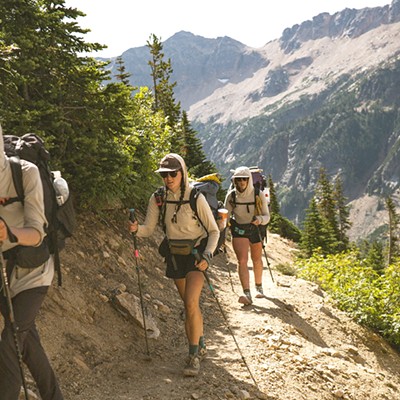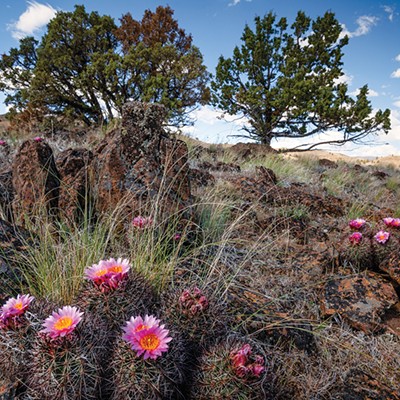Bend already lays claim to the title “Bike Town U.S.A.,” but it may be time to add “Ultra Runners ‘R Us” to our town’s moniker.
Bendites dominated the recent GORE TEX Trans-Rockies Run, a 120-mile, six-day stage race in Colorado that concluded on August 18. Bend sent eight runners to the race, which started in Buena Vista and finished in Beaver Creek and included approximately 20,000 feet of altitude gain, and each day all eight Bendites made podium appearances.
Zach Violett and Stephanie Howe returned to the race hoping to improve on last year’s third-place finish in the “open mixed” category. The couple, now experienced in the ways of stage racing, blew the other co-ed teams out of the water and won the six-day race in 17 hours, 47 minutes—two hours ahead of the second place team.
According to Violett, the win didn’t come easy as each day included somewhere between 14-24 miles of running, which took, on average, three hours to complete. What made the difference, Violett said, was their preparation.
“This year we did more training, we knew the course, we were more patient—the first day we really held back that five to 10 percent,” said Violett.
“I actually feel okay. I’m not limping too bad or anything,” he added.
Max King, Bend’s best ultra runner, won the 58.4-mile three-day solo race in 7 hours, 19 minutes after finishing second last year while racing in the six-day team event.
For the second year in a row, Bend husband and wife power duo, Jeff and Katie Caba, won the masters mixed category (combined age of 80-plus) in the six-day event in 19 hours, 20 minutes. Racing for Patagonia, Jeff Browning and Rod Bien of Bend finished second overall in the masters men category (80-plus) in a time of 17 hours, 29 minutes, just 16 minutes off of first place. And in the open men’s category Bend’s Mario Mendoza and teammate Jorge Maravilla finished third in 16 hours, 34 minutes.
Public comment period for access to Trout Creek climbing area now open
Access to the splitter cracks at Trout Creek, bluffs located 10 miles north of Madras overlooking the Lower Deschutes River, has been spotty as of late.
This past winter the Bureau of Land Management closed the popular crag in order to allow a pair of golden eagles to nest and thrive. The BLM’s emergency closure in February drew the ire of the local climbing community, not because the climbers don’t care for the eagles—they do—but because the government agency offered no warning of the closure. The BLM, to its credit, quickly owned up to their shortcomings and allowed the climbing community to operate a self-imposed “voluntary closure.” It officially reopened access to the crag in May.
The BLM is now going the extra mile to include climbers and other user groups in the new Environmental Assessment plan. Public comment period for access to and management of the area opened on August 17 and will run through September 15. The BLM is urging specific input, particularly as it pertains to their three proposed action plans. The agency expects to make a decision by the end of October.
For Jeff Wenger, a local climber and author of a guidebook on the area, the only action that makes sense is option number two, which would only restrict climbing access from January 15 through May 15 (provided that there is no evidence of successful eagle nesting, which there hasn’t been since 2002, according to management data).
Wenger and the rest of the climbing community would like to make it clear that they are pulling for birds and only want what is sensible and supported by local biologists.
“People really want to see these birds thrive,” Wenger said. “A success of a nesting pair would make us all feel great. That’s much more important than climbing on a bunch of rocks.”
Wegner said he’s also been pleased with how supportive the BLM has been since this past winter.
“They were super cool. They got us a spotting scope, we collected data and the next weekend they had the place open,” Wenger said.
According to the BLM’s Prineville-based spokeswoman, Lisa Clark, the climbing community has proven to be good stewards of the area since the closure was lifted in May
“We’ve had a very good response from the climbing community,” Clark said. Clark notes that the BLM caught a few closure violations on camera, but she suspects that the perpetrators were not climbers. Clark said she hopes that her agency can continue to work with climbers to form an agreeable plan.
“We appreciate them doing the extra work to find that middle ground—it’s a hell of a lot easier to stamp a place closed,” Wenger said. “Hopefully it’ll be win-win.”
To view the proposed action for the Trout Creek area visit blm.gov/or and search for the Prineville area. Email your comments to [email protected] with the words “Trout Creek” in the subject line.
Photo taken by Klaus Fengler




















